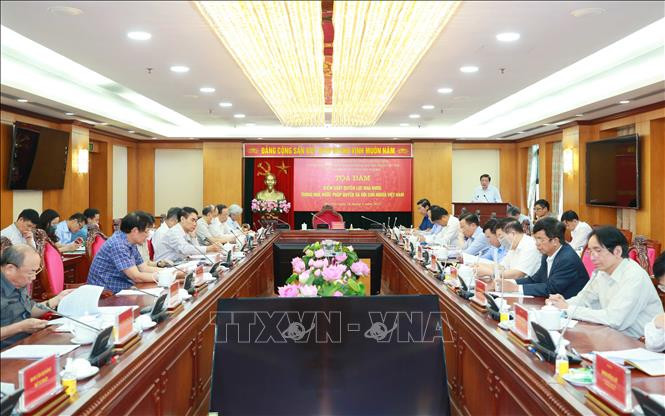This is a very urgent practical issue that needs to be fundamentally and satisfactorily resolved so that the power given by the people to the state can operate properly and effectively, serving the country and the people.

Seminar scene
On the morning of May 16 in Hanoi, the Steering Committee of the Project "Strategy for building and perfecting the Socialist Rule of Law State of Vietnam to 2030, with a vision to 2045" held the third discussion with the theme "Controlling state power in the Socialist Rule of Law State of Vietnam".
Speaking at the seminar, Comrade Phan Dinh Trac, Politburo member, Secretary of the Party Central Committee, Head of the Party Central Committee's Internal Affairs Commission, and Permanent Deputy Head of the Steering Committee for the Project, stated that the 2013 Constitution stipulates: State power is unified, with division of labor, coordination and control among state agencies in the exercise of legislative, executive and judicial powers. This is a very specific principle of organizing state power, becoming one of the basic characteristics of the socialist rule of law state of Vietnam. In fact, our Party and State are increasingly interested in leading, directing the organization, operation and control of state power in the spirit of the Constitution, in which the control of state power is emphasized. Especially since the 12th Party Congress, the Central Committee has proposed many drastic policies and solutions to "lock power in an institutional cage", as the General Secretary once emphasized. The documents of the 12th and 13th National Congresses all emphasize strengthening the control of state power. The Politburo has issued Regulation 205-QD/TW on controlling power in personnel work and combating the abuse of power and positions. The Central Executive Committee (13th tenure) has issued Conclusion 21 on promoting the building and rectification of the Party and the political system... in which it directs "Focus on perfecting the mechanism of controlling power and strengthening the prevention and fight against corruption and negativity in anti-corruption and negativity agencies". Agencies are urgently developing projects to implement according to the Politburo's plan.
At the seminar, opinions focused on exchanging, discussing, and analyzing reality to make proposals for effective control of state power; analyzing the connotation of the principle of organizing state power, state power is unified with division, coordination and control among state agencies in exercising legislative, executive and judicial powers; the unity of state power; clarifying the role, position and authority of the President in organizing, operating and controlling state power...
Concluding the discussion, Head of the Central Internal Affairs Committee Phan Dinh Trac stated: Through the discussion, the delegates emphasized that state power is unified, a derivative power delegated by the people. State power is always at risk of being corrupted, so it is inevitable to control state power. Controlling power is understood as all methods, processes, and regulations to detect, prevent, and eliminate wrongdoings in the exercise of power, ensuring that power is exercised for the right purpose and with the highest efficiency, without being abused or exploited...
The opinions refer to the control of power within each state agency; control between state agencies in the implementation of legislative, executive and judicial powers and other institutions (President, Procuracy, State Audit...); control between central and local agencies; the method of implementing power control is the state's control by the Party, by the people, by society, by the press...
Opinions say that to control state power well, there are 5 specific conditions: Having a smart, tight institution; clearly defining and assigning tasks and powers of each state agency, thereby determining a good overall state model; innovating the organization and adding some powers of state agencies (such as the National Assembly, the Government, the Procuracy, the President...) and establishing some independent institutions...; enhancing transparency, accountability, responsibility of the head and ensuring the right to access information and other basic rights of citizens; having a team of exemplary, responsible, professional civil servants with adequate qualities and capacity and strictly implementing existing regulations... Many opinions say that there are many good foreign experiences but it is necessary to research, filter, and select contents suitable for Vietnam to apply.
According to VNA